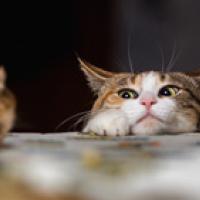
Can cats do logic?
Of course they can! Any cat knows that pawing the box of cat biscuits will make it fall over and the biscuits pour out. That's a firm grip on the law of cause and effect. But what if the box is empty? Can cats deduce this fact from the sound or feel of the box, or are they simply taking their chances? How much can cats infer from incomplete information?

It's a question that has recently received a partial answer in a (refreshingly simple) experiment conducted by scientists in Japan. The study showed that cats know what it means when a container rattles when shaken, and that they expect something to fall out when the container is turned over. This may not appear hugely impressive, but our relatives, the great apes, have failed similar tests. Cats themselves haven't fared well in other tasks testing their causal understanding (for example tests involving the pulling of strings) and were therefore thought a little unsophisticated in that respect. The new study appears to vindicate them.
Thirty cats took part in the study, and here is how the researchers tested them. They presented each cat with a container that did or did not rattle when shaken. The container was then turned over and an object did or did not fall out — but not always in line with what you'd expect. In some cases a rattling box did reveal an object when turned over, but in others it didn't. Conversely, a non-rattling box could also reveal an object, or not. Once the container had been turned over, the cat was allowed to go and explore. If cats do understand the connection between rattling and the existence of objects and if they understand gravity, then, so the reasoning goes, they should act surprised when the unphysical situation occurs.
This, the researchers say, is exactly what happened. Cats spent more time looking at the containers that didn't confirm with the laws of physics, than they did at those which did. This suggests they do understand the causal connection between sound and object and have a grasp on gravity.
In some ways the result isn't surprising. Cats often hunt in dark places, which means they need to rely on their ears as much as their eyes to detect their prey. For primates this isn't the case — and rather than indicating food, sound for primates often indicates danger and something to turn away from.
More generally the study sheds light on how ecological factors influence animals' ability to make inferences from sound. It doesn't indicate that cats are likely to take up mathematical logic any time soon.
Comments
Gary
I've seen Jackdaws do the same thing.
Logic
Cats all do logic. Mine loves the smell of coffee, because it precedes breakfast every day. His predecessor would wait by the front door after hearing me order a food delivery on the phone. Perhaps he knew sundown calls preceded dinner deliveries.
Of course I insisted to my wife that Freddie knew our address, so when he heard it he knew food was coming!